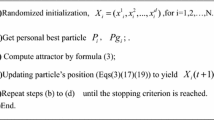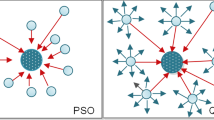Abstract
Based on the previous proposed Quantum-behaved Particle Swarm Optimization (QPSO), in this paper, a novel and more efficient search strategy with a selection operation is introduced into QPSO to improve the search ability of QPSO. While the center of position distribution of each particle in QPSO is determined by global best position and personal best position, in the Modified QPSO (MQPSO), the global best position is substituted by a personal best position of a randomly selected particle. The MQPSO also maintains the mean best position of the swarm as in the previous QPSO to make the swarm more efficient in global search. The experiment results on benchmark functions show that MQPSO has stronger global search ability than QPSO and PSO.
Preview
Unable to display preview. Download preview PDF.
Similar content being viewed by others
References
Angeline, P.J.: Evolutionary Optimization Versus Particle Swarm Optimization: Philosophy and performance Differences. In: Porto, V.W., Waagen, D. (eds.) EP 1998. LNCS, vol. 1447, pp. 601–610. Springer, Heidelberg (1998)
Angeline, P.J.: Using Selection to Improve Particle Swarm Optimization. In: Proc. 1998 IEEE International Conference on Evolutionary Computation, pp. 84–89 (1998)
Van den Bergh, F.: An Analysis of Particle Swarm Optimizers. PhD Thesis, University of Pretoria, South Africa (2001)
Clerc, M.: The Swarm and Queen: Towards a Deterministic and Adaptive Particle Swarm Optimization. In: Proc. 1999 Congress on Evolutionary Computation, pp. 1951–1957 (1999)
Clerc, M., Kennedy, J.: The Particle Swarm: Explosion, Stability, and Convergence in a Multi-dimensional Complex Space. IEEE Transactions on Evolutionary Computation 6(1), 58–73 (2002)
Eberhart, R.C., Shi, Y.: Comparison between Genetic Algorithm and Particle Swarm Optimization. In: Porto, V.W., Waagen, D. (eds.) EP 1998. LNCS, vol. 1447, pp. 611–616. Springer, Heidelberg (1998)
Holland, J.H.: Adaptation in Natural and Artificial Systems. The University of Michigan Press, Ann Arbor (1975)
Kennedy, J., Eberhart, R.C.: Particle Swarm Optimization. In: Proc. IEEE 1995 International Conference on Neural Networks, IV, pp. 1942–1948 (1995)
Kennedy, J.: Small worlds and Mega-minds: Effects of Neighborhood Topology on Particle Swarm Performance. In: Proc. 1999 Congress on Evolutionary Computation, pp. 1931–1938 (1999)
Suganthan, P.N.: Particle Swarm Optimizer with Neighborhood Operator. In: Proc. 1999 Congress on Evolutionary Computation, pp. 1958–1962 (1999)
Sun, J., Feng, B., Xu, W.-B.: Particle Swarm Optimization with Particles Having Quantum Behavior. In: Proc. 2004 Congress on Evolutionary Computation, pp. 325–331 (2004)
Sun, J., Xu, W.-B., Feng, B.: A Global Search Strategy of Quantum-behaved Particle Swarm Optimization. In: Proc. 2004 IEEE Conference on Cybernetics and Intelligent Systems, Singapore, pp. 111–115 (2004)
Sun, J., Xu, W.-B., Feng, B.: Adaptive Parameter Control for Quantum-behaved Particle Swarm Optimization on Individual Level. In: Proc. 2005 IEEE International Conference on Systems, Man and Cybernetics, pp. 3049–3054 (2005)
Shi, Y., Eberhart, R.: Empirical Study of Particle Swarm Optimization. In: Proc. 1999 Congress on Evolutionary Computation, pp. 1945–1950 (1999)
Shi, Y., Eberhart, R.C.: A Modified Particle Swarm. In: Proc. 1998 IEEE International Conference on Evolutionary Computation, pp. 69–73 (1998)
Author information
Authors and Affiliations
Editor information
Rights and permissions
Copyright information
© 2007 Springer Berlin Heidelberg
About this paper
Cite this paper
Sun, J., Lai, C.H., Xu, W., Chai, Z. (2007). A Novel and More Efficient Search Strategy of Quantum-Behaved Particle Swarm Optimization. In: Beliczynski, B., Dzielinski, A., Iwanowski, M., Ribeiro, B. (eds) Adaptive and Natural Computing Algorithms. ICANNGA 2007. Lecture Notes in Computer Science, vol 4431. Springer, Berlin, Heidelberg. https://doi.org/10.1007/978-3-540-71618-1_44
Download citation
DOI: https://doi.org/10.1007/978-3-540-71618-1_44
Publisher Name: Springer, Berlin, Heidelberg
Print ISBN: 978-3-540-71589-4
Online ISBN: 978-3-540-71618-1
eBook Packages: Computer ScienceComputer Science (R0)




